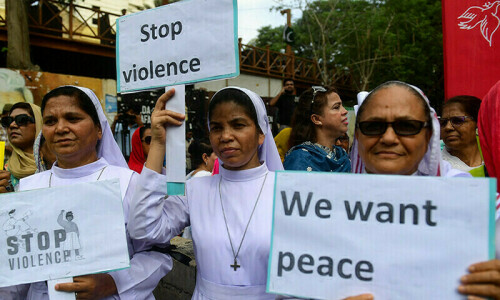BRUSSELS: Belgium has become the first country to allow euthanasia for terminally ill children of all ages, after a heated debate in which critics questioned a child's ability to make the decision to die.
Despite opposition from the Church, which called the move “a step too far”, and some pediatricians, parliament adopted the legislation Thursday by 86 votes to 44, with 12 abstentions.
The ground-breaking legislation makes the largely Catholic country the second after the Netherlands to allow mercy-killing for children, and the first to lift all age restrictions.
Unlike the Dutch across the border, where euthanasia is allowed for children over 12, the law states that any incurably sick child may request to end their suffering if “conscious”, and if equipped with “a capacity of discernment”.
An emotional debate before the vote was interrupted by a man who shouted out “murderers” in French, before being removed from the house.
“It is not a question of imposing euthanasia on anyone... but of allowing a child not to agonise in pain,” said Socialist MP Karine Lalieux ahead of the vote.
Belgium is one of three countries in Europe to allow euthanasia for adults, and a poll last October showed 73 per cent supported extending the right to children.
“The right to consider the question of life and death cannot be restricted to adults,” said liberal MP Daniel Bacquelaine.
Addressing controversy over the decision not to set an age restriction for “discernment”, he said a child's “legal age isn't the same as mental age”.
But opponents, largely members of centrist Christian-leaning parties, attacked the legislation for failing to set a minimum age for youngsters to be able to request euthanasia.
- 'The world is watching us in amazement'-
Saying “the world is watching us in amazement”, Christian Democrat Sonja Becq said a child's “capacity of discernment” was a “vague” concept, “a grey area”.
“How will a doctor determine whether a child has a capacity of discernment?” she asked.
Socialist senator Philippe Mahoux, author of Belgium's historic 2002 “right to die” legislation and himself a doctor, had called for the law to be widened to minors so as to provide a legal framework for medics who help children in pain die as a question of mercy, but outside the law.
Euthanasia is “the ultimate gesture of humanity” and “not a scandal”, he said. “The scandal is illness and the death of children from disease.”The law offers the possibility of euthanasia to children “in a hopeless medical situation of constant and unbearable suffering that cannot be eased and which will cause death in the short-term”.
Counselling by doctors and a psychiatrist or psychologist is required, as is parental approval.
Before its adoption by a huge majority in the Senate in December, the upper house consulted dozens of medical specialists, lawyers and interest groups.
But during public debate, religious leaders of all faiths argued that extending euthanasia to the young risked “trivialising” death.
- 'A step too far' -
In recent days, the Catholic Church staged “a day of fasting and prayer” in protest, and this week some 160 pediatricians petitioned lawmakers to postpone the vote on the grounds it was both ill-prepared and unnecessary.
Thursday's vote went “a step too far”, Belgian bishops said in a joint statement.
They said they feared the legislation would “open the way to handicapped people, people with dementia, the mentally ill or those who are tired of living” to seek mercy-killing.
“Pain can be eased nowadays, there's been huge progress in palliative care,” said cancer specialist and signatory Nadine Francotte.
In a stormy exchange in parliament on the eve of the vote, opponents argued that modern palliative medication could relieve pain in very sick youngsters, therefore allowing illness to run a natural course to death.
But Brussels palliative specialist Dominique Lossignol said it was mistaken to believe palliative care could remedy suffering.
“We do not have control over all types of pain, either physical or moral,”he told AFP. “We doctors have been asking for an extension of the law for years.”
Thursday's vote saw Socialists, Liberals and Greens members largely line up in favour, with centrist Christian-leaning parties opposed.
- Ill children are often more mature -
Critics said the legislation failed to address problems and potential loopholes such as possible discord between the two parents over a child's request to be euthanised.
And they asked how adults could be sure that a child had the “discernment” necessary to decide to give up life or even really understand the notion.














































